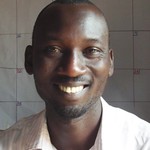At the GDPU’s office the power comes and goes. Sometimes it’s just our line or it’s the entire town. I have now become more surprised when the power is on when I get to the office, than when it’s off. On Wednesday, it was typical no-power day. This time it was all of Gulu, meaning it would take longer than usual to get the power back on. By 10am my laptop had died and I was trying to sort out what I could do without my computer. When Okema Moses, a Project Officer at GDPU, told me he was heading to the TASO office for a meeting I jumped at the opportunity. Last year when I was in Uganda I had been impressed by the work of TASO in reducing the prevalence of HIV in Uganda. The prospect of visiting their office and learning from the many partner organizations was one I wasn’t going to pass up.
The meeting as I found out was called among HIV/AIDS organizations in Gulu to share experiences and challenges. Moses, of GDPU, was the first to speak. Although GDPU does not currently have an operating HIV program, the organization sometimes works as a linkage between the disability community and local HIV organizations. Moses spoke of the challenges in getting information and services to persons with disability (PWDs). Most often HIV organizations only go to the central part of town, which is often difficult for those who have a challenge with mobility, and never have a sign language interpreter with them. He then discussed the discrimination persons with disabilities face as a result. Many of those in the community often believe that PWDs are the safest in community, in regard to the transmission of HIV. They often forget that PWDs have the same desires as any other community member, yet are easily overlooked in this regard. There are also factors that put PWDs at a higher risk of infection such as low self-esteem, higher instances of sexual abuse, and rumors that having sex with someone with a disability will cure HIV or AIDS.
At the end of his short presentation, Moses urged other organizations to join with GDPU and work together to reach those PWDs who have been long ignored. In the world of competition between NGOs for grants and resources it unfortunately breeds lack of cooperation between organizations. To implement change, however, partnerships between NGOs is necessary; as the current competition between groups only harms those which are meant to be served and represented.
Posted By Kathryn Dutile (Uganda)
Posted Jul 9th, 2014


